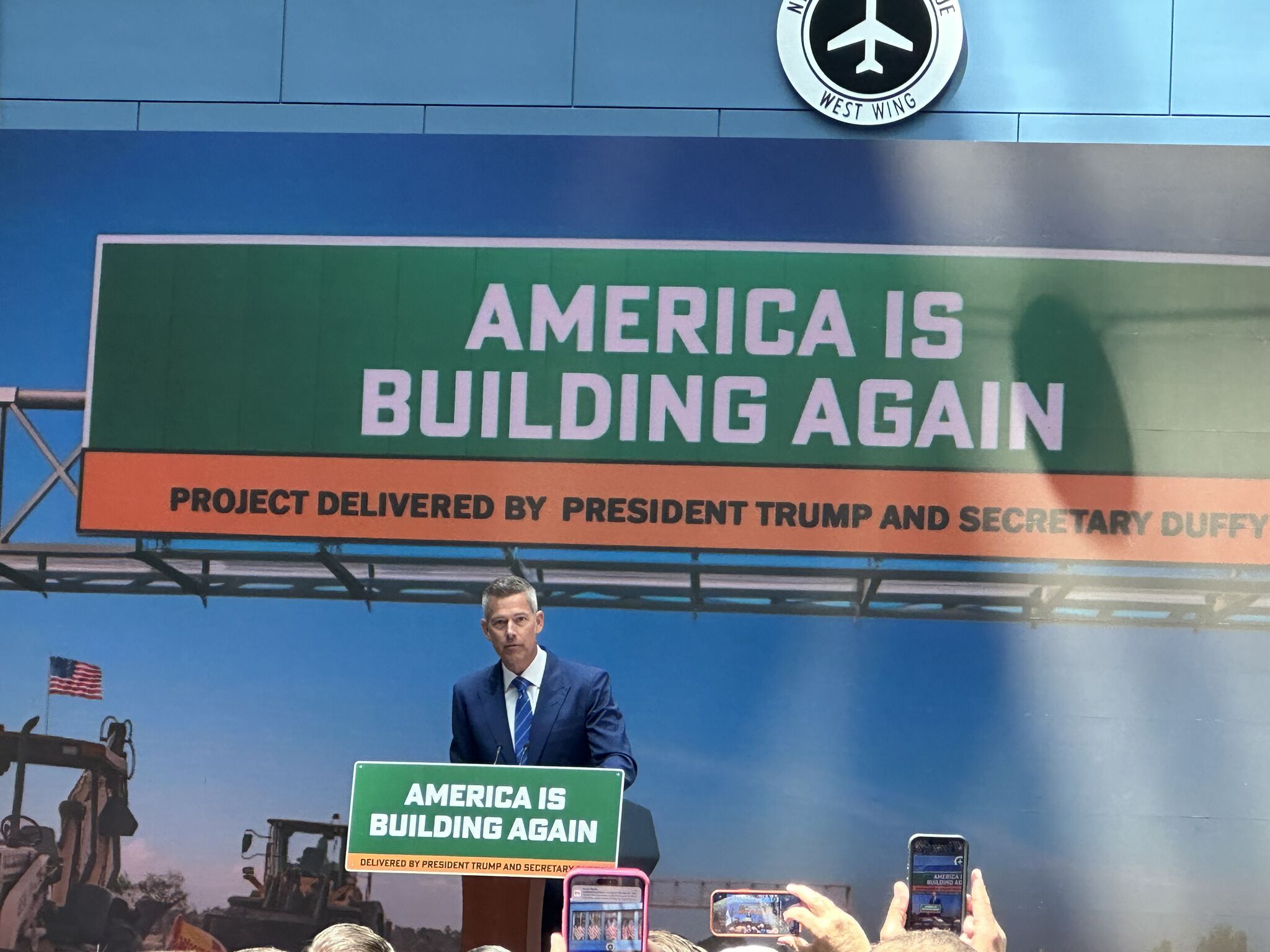In this issue:
Previous issues:
TCB Vol. 19 No. 4
05-30-25
TCB Vol. 19 No. 3
03-04-25
TCB Vol. 19 No. 2
11-22-24
TCB Vol. 19 No. 1
10-31-24
TCB Vol. 18 No. 7
09-27-24
TCB Vol. 18 No. 6
07-17-24
TCB Vol. 18 No. 5
06-04-24
TCB Vol. 18 No. 4
03-21-24
The Trade Corridor Bulletin
Volume 19 – No. 5 | August 2025
Senate and House Committees Approve Inconsistent FY26 Transportation Funding Bills
Senate Proposal Includes $4.4 Billion More in USDOT Discretionary Funding Than House Version
By: Amanda Hampton, CAGTC Communications Manager
Both the House and Senate Appropriations Committees approved their fiscal year (FY) 2026 Transportation, Housing and Urban Development (THUD) appropriations bills – annual legislation enacted to fund the U.S. Department of Transportation (USDOT). Due to the House and Senate advancing differing proposals, legislators must resolve the differences to approve a final bill by the October 1 deadline to prevent a government shutdown.
The FY26 proposals include funding set aside for earmarks, which is a significant difference from the appropriations enacted for FY25. Since Congress passed a full-year continuing resolution for FY25 that simply extended FY24 funding levels, lawmakers did not provide any additional funding for earmarked projects last year.
Senate FY26 THUD Proposal
On July 24, the Senate Appropriations Committee approved its THUD proposal by a 27-1 vote. The bill would provide USDOT with $26.5 billion in discretionary funding, $1.3 billion more than the amount enacted for FY25. Under the proposal, certain grant programs would receive FY26 annual appropriations funding in addition to the FY26 funds provided to these programs by the Infrastructure Investment and Jobs Act (IIJA).
- Better Utilizing Investments to Leverage Development (BUILD formerly RAISE): $250 million in FY26 funds in addition to the $1.5 billion provided by the IIJA, totaling $1.75 billion.
- Consolidated Rail Infrastructure and Safety Improvements Program (CRISI): $151.5 million in FY26 funds in addition to the $1 billion made available by the IIJA, totaling $1.151 billion (includes funding set aside for earmarks).
- Port Infrastructure Development Program (PIDP): $96.5 million in FY26 funds in addition to the $450 million provided by the IIJA, totaling $546.5 million (includes funding set aside for earmarks).
Consistent with the funding laws enacted for recent fiscal years, the Senate did not provide additional appropriations for the Nationally Significant Multimodal Freight & Highway Projects (INFRA) and Mega grant programs. Both the INFRA and Mega program received advance appropriations for FY26 from the IIJA, most of which was already awarded under the Biden Administration.
The Office of Multimodal Freight Infrastructure and Policy (Freight Office) would receive $3.97 million for salaries and expenses. Of this amount, $2 million is reserved for the Freight Logistics Optimization Works (FLOW) program – a public-private partnership between industry stakeholders and the government to support and enhance supply chain data coordination.
The Senate proposal contains nearly $992 million for earmarked projects, including $581 million in highway infrastructure program funding, and $51.5 million in CRISI funding, and $21.5 million in PIDP funding. The list of designated projects can be found here.
The Committee’s annual report, released alongside the legislation, provides guidance to USDOT on the proposed funding provisions. To enhance the FLOW Program, the Committee encouraged the Department to integrate artificial intelligence and machine learning tools into the initiative. Also related to the FLOW program, the Committee recommended that USDOT coordinate with the Department of Homeland Security Supply Chain Resiliency Center to improve forecasting and planning for potential supply chain disruptions. The report specifically mentions staffing at U.S. ports as one of the potential scenarios that requires planning.
The bill text can be found here and the full committee report can be found here.
House FY26 THUD Proposal
The House Committee on Appropriations approved its THUD proposal by a 35-28 vote on July 17. Under the House proposal, USDOT would receive $22.1 billion in discretionary funding, $3.1 billion less than the amount enacted for FY25. The House bill provided certain grant programs with funding supplemental to the IIJA advance appropriations.
- CRISI: $538.4 million in FY26 funds in addition to the $1 billion made available by the IIJA, totaling $1.538 billion (includes funding set aside for earmarks).
- PIDP: $123.5 million in FY26 funds in addition to the $450 million provided by the IIJA, totaling $573.5 million (includes funding set aside for earmarks).
- INFRA: $200 million (reserved for truck parking projects) in addition to the $1.5 billion provided by the IIJA, totaling $1.7 billion.
House appropriators provided $7 million for the Freight Office. Of this amount, $5 million is intended to launch a nationwide dashboard for shippers and carriers to track real-time supply chain movements and better respond to bottlenecks, as part of the FLOW initiative.
The House proposal also includes approximately $1.4 billion for transportation projects in Community Project Funding earmarks, including $954 million in highway infrastructure program funding, $38.4 million in CRISI funding, and $43.5 million in PIDP funding. The list of designated projects can be found here.
The bill text can be found here.
Key Differences & Next Steps

Overall, the Senate bill provides roughly $4.4 billion more in discretionary funding for USDOT in comparison to the House proposal. While the Senate provided more funding for the BUILD program, the House provided higher funding for PIDP, CRISI, and INFRA. The House also provided roughly $3 million more for the Freight Office than the Senate.
Further negotiations are necessary for the two chambers to reconcile these differences and develop a final package that can advance through Congress. Lawmakers are not expected to resume work on the legislation until they return from August recess. While Congress is working to deliver a comprehensive funding package to the President Trump’s desk by October 1, lawmakers also have the option of passing a continuing resolution to avert a government shutdown and provide additional time for negotiations.
Industry News
President Trump’s Transportation Secretary Sean P. Duffy Announces Nearly $500 Million in Funding to Revitalize American Infrastructure
On July 15, U.S. Transportation Secretary Sean P. Duffy announced $488 million in awards from the Better Utilizing Investments to Leverage Development (BUILD) grant program for 30 projects across the country. The funding will support critical roadway, transit, rail, maritime, and aviation infrastructure improvements that improve safety, reduce congestion, and spur economic growth.
“Under President Trump, America is building again,” said U.S. Transportation Secretary Sean P. Duffy. “From making families safer on our roads to expanding our ports, these grant selections reflect our commitment to unleashing America’s full potential with envy-of-the-world infrastructure. We will continue to move quickly to get money out the door to get dirt moving.”
America’s BUILD program delivered awards to the most competitive projects out of more than 800 applications requesting more than $10 billion. Funding is evenly distributed between urban and rural communities, with each receiving $244 million in awards. Maximum awards are capped at $25 million.
The full list of awarded projects can be found here. Read the full release here.
Industry News
U.S. Transportation Secretary Sean P. Duffy Kicks Off Surface Transportation Reauthorization to Get America Building Again
 On July 17, U.S. Transportation Secretary Sean P. Duffy brought together Congressional members and infrastructure stakeholders in a first-of-its-kind conference to foster collaboration on priorities ahead of Congress’s surface transportation reauthorization process later this fall.
On July 17, U.S. Transportation Secretary Sean P. Duffy brought together Congressional members and infrastructure stakeholders in a first-of-its-kind conference to foster collaboration on priorities ahead of Congress’s surface transportation reauthorization process later this fall.
During his remarks, Secretary Duffy outlined President Trump’s America is Building Again agenda, including:
- Enhancing transportation safety, including bridges, safety for transportation workers and pedestrians, truck parking, and autonomous vehicles.
- Accelerating project delivery for transportation projects, including reforming the National Environmental Policy Act (NEPA) and permitting, enhancing One Federal Decision, and increasing the use of technology.
- Increasing opportunities through investment in transportation infrastructure that promotes economic growth, including through expanded capacity and mobility, congestion relief, and more private sector investment.
- Strengthening partnerships with States and other key stakeholders to improve transportation outcomes, including prioritizing the federal interest, greater efficiencies, and research.
The current Surface Transportation Authorization expires on September 30, 2026. Reauthorization for surface transportation programs sets the funding levels, policy directives, and programmatic requirements for the Federal Highway Administration (FHWA), the Federal Motor Carrier Safety Administration (FMCSA), the Federal Railroad Administration (FRA), the Federal Transit Administration (FTA), the National Highway Traffic Safety Administration (NHTSA), and the Pipeline and Hazardous Materials Safety Administration (PHMSA).
Read the full release here.
Member Spotlight
Governor Newsom Appoints New Caltrans Director

Governor Gavin Newsom announced the appointment of Dina El-Tawansy as the new Director of the California Department of Transportation (Caltrans). In her new role, El-Tawansy will oversee management of more than 50,000 miles of California's highway and freeway lanes and a budget of nearly $18 billion. Caltrans carries out its mission with six primary programs: Aeronautics, Highway Transportation, Mass Transportation, Transportation Planning, Administration and the Equipment Service Center.
El-Tawansy brings a wealth of experience and leadership to the role, having held multiple positions at Caltrans since 1998, including District 4 Acting Director; District 4 Chief Deputy Director; District 12 Deputy Director of Operations and Maintenance; and Regional Project Manager. Most recently, she served as the Caltrans District 4 (Bay Area) Director.
El-Tawansy earned a Master of Science degree in Construction Management from California State University, Long Beach and a Bachelor of Science degree in Civil Engineering from California Polytechnic State University, Pomona.
Read the full release here.
Member News
Joni Casey Receives Intermodal Industry’s Highest Honor

The Intermodal Association of North America announced that Joni Casey, its previous president and CEO, will be honored with the 2025 Silver Kingpin Award during this year’s Intermodal EXPO, Sept. 15-17, in Long Beach, California.
During her 27-year tenure, IANA grew its membership to more than 1,000; expanded the scale and scope of its Intermodal Information Services; and championed the university scholarship program now named for Casey. Prior to joining IANA, she was the executive director of the American Trucking Association’s Intermodal Council, and the president and CEO of the Transportation Intermediaries Association.
“Joni left an indelible mark on the intermodal industry,” said Anne Reinke, IANA’s president and CEO. “She wasn’t just a remarkable association executive — she was a visionary who helped grow IANA’s Information Services. Her dedication and leadership will be remembered and felt throughout the industry for years to come.”
The Silver Kingpin, started by the National Piggyback Association in 1977, recognizes an individual’s long-term contributions to intermodalism. It is the industry’s most prestigious award, reflecting the support of the recipient’s peer group in a given year.
Read the full release here.
Research News
Freight Rail for the 21st Century: Opportunities for Mode Shift to Improve Efficiency and Resiliency
On July 31, the Eno Center for Transportation published a new report providing an analysis of the freight sector and a modal shift toward rail in addition to providing public policy recommendations to enhance the multimodal freight system.
Read the full report here.
Research News
Infrastructure Investment and Jobs Act: DOT Should Better Communicate Funding Status and Assess Risks
The Government Accountability Office issued a report assessing the status of IIJA grant funding, detailing the challenges grant awardees must navigate, and evaluating the risks resulting from such challenges.
Read the full report here.
